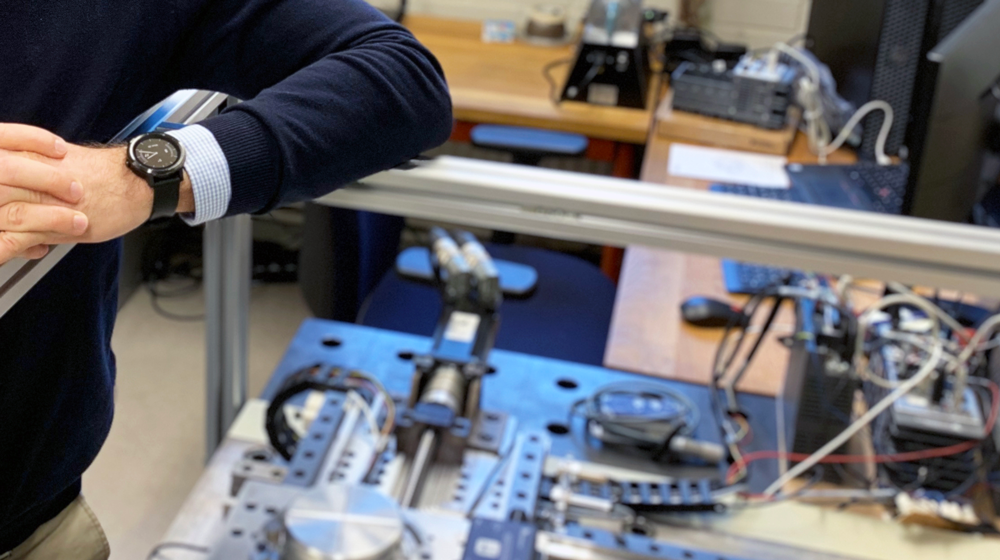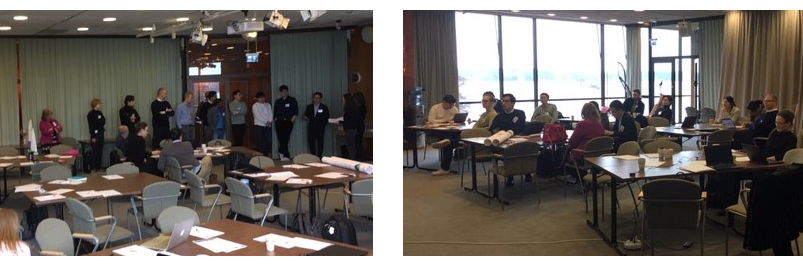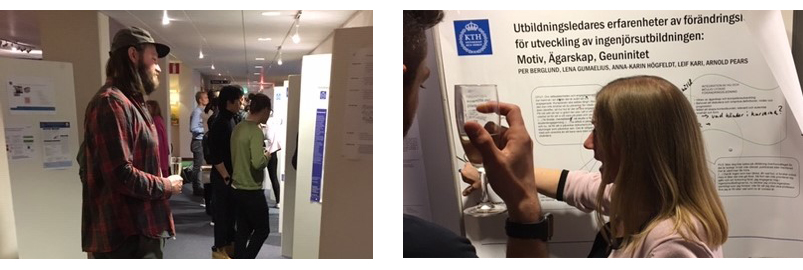In English further down. (Photo: Anneli Nygårds)
Lätt att tappa bort skrivande och handledning av doktorander
Jag misstänker att många liksom jag känner att arbetsdagarna för tillfället fylls av otaliga möten och föreläsningar på Zoom och Teams, alltför ofta utan några längre pauser. Även om de flesta aktiviteterna online fungerar alldeles utmärkt rent tekniskt är det lätt att sakna den vanliga vardagens miljöombyten, tillfälliga avbrott och spontana möten med kollegor och studenter. Jag hoppas givetvis att vi om ett par månader ska ha tagit oss igenom den här pandemin och successivt återgå till en mer normal vardag, men tills vi är där får vi gemensamt göra det bästa för att hålla arbetsglädjen uppe och klara av våra uppgifter på bästa möjliga sätt.
Att få grundutbildningen att fungera väl trots omständigheterna kräver för tillfället en hel del tid och ansträngning och en konsekvens av det är att det just nu riskerar bli lite mindre tid än vanligt för annat. Från min egen forskning om innovationsledning känner jag igen att det som uppfattas som brådskande väldigt ofta tränger ut aktiviteter som har lite längre ledtid, som exempelvis forskning och innovation. Att se till att vår grundutbildning fungerar så väl det bara är möjligt är förstås av allra största vikt, men det är viktigt att vi i ivern att ge bra kurser inte tappar bort artikelskrivande och handledning av doktorander. En del av våra doktorander har just nu svårt att genomföra sin forskning enligt plan då de inte har möjlighet att utföra viss datainsamling. För att minimera de negativa effekterna av pandemin på forskarutbildningen är det därför viktigt att vi månar om att så långt det bara går hitta tillräckligt med tid för handledning och skrivande. Tydliga mål rörande artikelförfattande och reserverad tid för handledning är två enkla sätt att balansera kortsiktiga och långsiktiga aktiviteter, men givetvis måste det ske utan att den totala arbetsmängden fullständigt skjuter i höjden.
En del av forskarutbildningen som förhoppningsvis inte blir alltför lidande av pandemin är forskarutbildningskurserna. Dessa kan i många fall ges online med bibehållen kvalitet och distansundervisning gör det även enklare att följa kurser på andra lärosäten. För tillfället sker det en hel del arbete med dessa kurser på ITM, för att vi framöver ska ha både ett större kursutbud och högre regelbundenhet i deras genomförande. En viktig del i det arbetet är också att vi blir bättre på att utvärdera och förbättra forskarutbildningskurserna. I nuläget utvärderas inte alla kurser men för att kunna bedriva ett effektivt förbättringsarbete behöver vi göra det till rutin. Det underlag som skapas kommer att vara värdefullt för framtida utvärderingar, men först och främst ger det oss bättre möjligheter att lära och utveckla våra utbildningar.
/ Mats Magnusson, Forskarutbildningsansvarig på ITM-skolan
We tend to put aside writing and supervision of doctoral students
More time to get the first and second cycle education going and less time to other long-term activities. That can be the consequence for many researchers in the current pandemic, according to Mats Magnusson, responsible for ITM’s doctoral studies.
I guess that many, like me, feel that the working days are filled with countless meetings and lectures at Zoom and Teams at the moment, too often without longer breaks. Although most online activities work very well technically, it is easy to miss the usual everyday change of scenery, temporary interruptions and spontaneous meetings with colleagues and students. Of course, I hope that we in a couple of months are on the other side of this pandemic and gradually will return to a more normal everyday life; but until then, we can do our best together to keep the job satisfaction and manage our tasks in the best possible way.
Making the first and second cycle education work, despite the circumstances, currently requires a lot of time and effort, and a consequence of this is the risk that there will be a little less time for other things than usually. From my own research on innovation management, I recognize that what we perceive as urgent very often pushes out activities that have a slightly longer lead-time, such as research and innovation. Ensuring that our undergraduate education works as well as possible is of course essential, but it is important that we in the zeal to give good courses do not lose paper writing and supervision of doctoral students. Some of our doctoral students are currently finding it difficult to accomplish their research according to plan as they do not have the opportunity to carry out certain data collection. In order to minimize the negative effects of the pandemic on postgraduate education, it is therefore important to find enough time for supervision and writing as far as possible. Clear objectives regarding paper writing and blocked time for supervision are two simple ways to balance short-term and long-term activities, but of course, this must be done without the total amount of work completely skyrocketing.
One part of the postgraduate education that hopefully does not suffer too much from the pandemic are the PhD courses. These can be given online in many cases with maintained quality; also, distance learning makes it easier to follow courses at other universities. At the moment, a lot of work is being done with these courses at ITM, so that we in the future will have both a larger range of courses and higher regularity in their delivery. It is also essential that we get better at evaluating and improving postgraduate courses. Right now, not all courses are evaluated, but in order to be able to conduct effective improvement work, we need to make it a routine. The data that is created will be valuable for future evaluations, but first and foremost it gives us better opportunities to learn and develop our educations.
/ Mats Magnusson, Director of Third-Cycle Education at ITM



